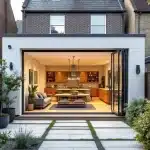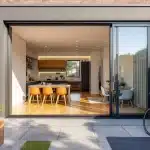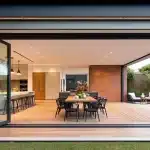House Extensions Melbourne: Your Options
Melbourne homeowners looking to expand their living space have several proven options. House extensions Melbourne projects can transform your property while adding significant value.
We at Cameron Construction see three main extension types dominating the market: double storey additions, ground floor expansions, and second storey builds. Each option offers unique benefits depending on your block size, budget, and lifestyle needs.
Which Extension Type Suits Your Melbourne Property
Double Storey Extensions Transform Narrow Blocks
Double storey extensions solve Melbourne’s biggest challenge: limited block width. Victorian building approvals data shows private sector dwellings excluding houses rose 26.0% in September 2025, with double storey builds leading this growth.
These extensions work best on blocks narrower than 8 metres where ground floor expansion hits boundary setbacks. The upper level typically houses bedrooms and bathrooms, while the ground floor accommodates living areas.
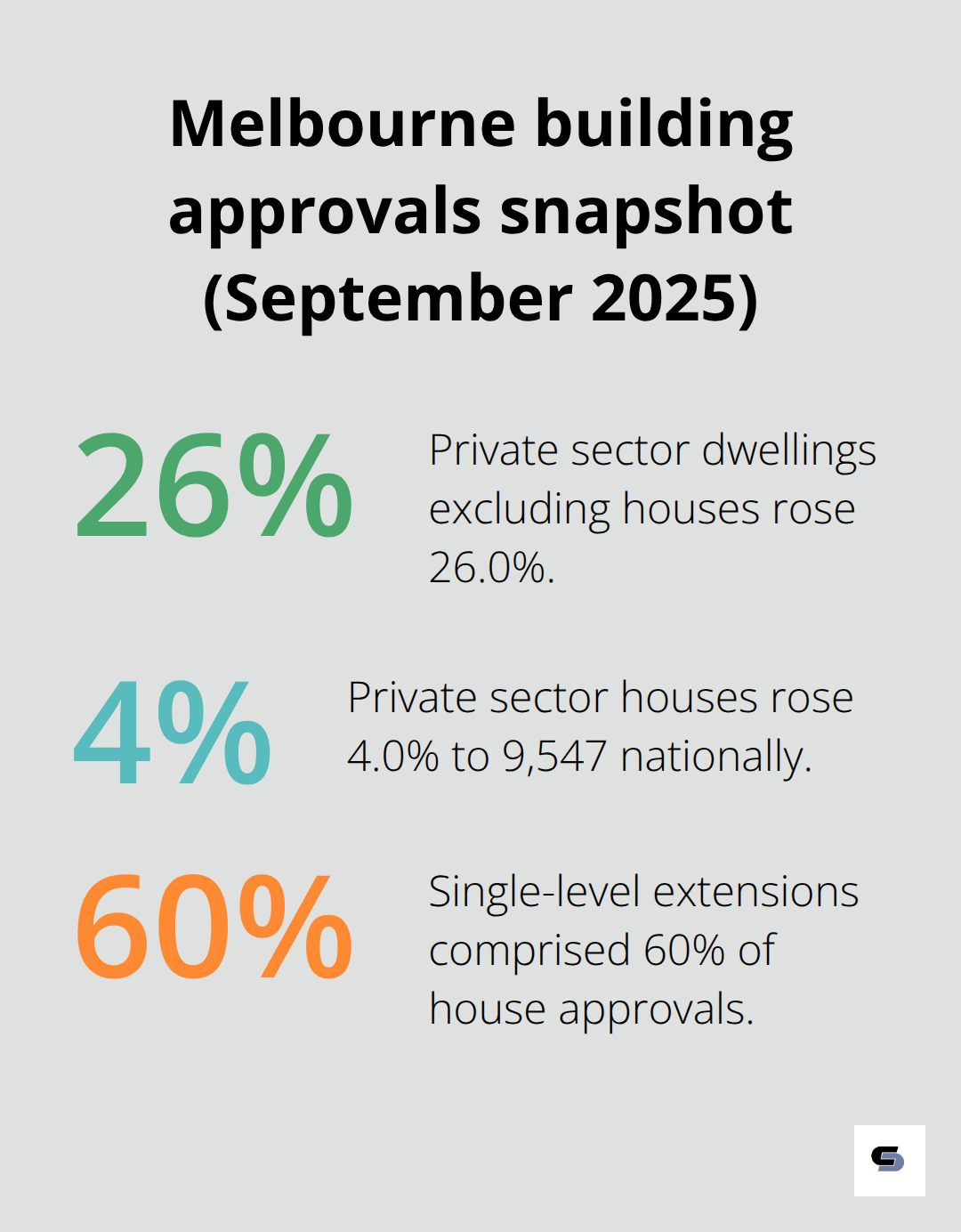
Construction costs average $3,200-$4,500 per square metre, but the space efficiency makes them worthwhile on premium inner-city blocks where land values exceed $1,200 per square metre. The vertical approach maximises your investment when horizontal space comes at a premium.
Ground Floor Extensions Maximise Outdoor Connection
Ground floor extensions suit blocks with adequate rear setback space (typically 15 metres or deeper). The September 2025 building data revealed private sector houses rose 4.0% to 9,547 nationally, with single-level extensions comprising 60% of these approvals.
Kitchen and living room extensions dominate this category, creating seamless indoor-outdoor flow through large sliding doors and covered alfresco areas. Construction costs run $2,800-$3,800 per square metre, making them more affordable than multi-level builds.
These extensions work exceptionally well on flat blocks where drainage and foundation work remains straightforward. The single-level design also suits families with young children or elderly residents who prefer step-free access.
Second Storey Additions Require Structural Assessment
Second storey additions demand comprehensive structural evaluation of existing foundations and framing. Melbourne’s Better Apartments Design Standards influence these projects, requiring adequate natural light and ventilation in upper levels.
Foundation upgrades typically add $15,000-$35,000 to project costs, depending on soil conditions and existing structural capacity. These additions suit post-1960 homes with concrete slab foundations and adequate ceiling height for staircase installation.
The complexity means longer construction timeframes, typically 16-22 weeks compared to 12-16 weeks for ground floor extensions. However, the additional floor space often delivers the highest return on investment for established properties.
Understanding these extension types helps you identify the best approach for your property. The next step involves navigating Melbourne’s planning and permit requirements to bring your vision to life.
What Permits Do Melbourne Extensions Actually Need
Melbourne extension permits follow a strict two-tier system that catches many homeowners off guard. Planning permits through local councils address neighbourhood character, setbacks, and privacy issues, while building permits focus on structural safety and Building Code of Australia compliance. The Victorian Building Authority requires both permits for most extensions that exceed $10,000, with major domestic building contracts mandatory for work worth more than $10,000.
Council Requirements Vary Dramatically Across Melbourne
Inner Melbourne councils like Stonnington and Port Phillip enforce heritage overlays that affect 70% of properties. These councils require detailed design reports and neighbour consultation periods that extend 21 days beyond standard timeframes. Outer councils like Wyndham and Casey focus heavily on bushfire management overlays and flood risk assessments, particularly for ground floor extensions in growth corridors.
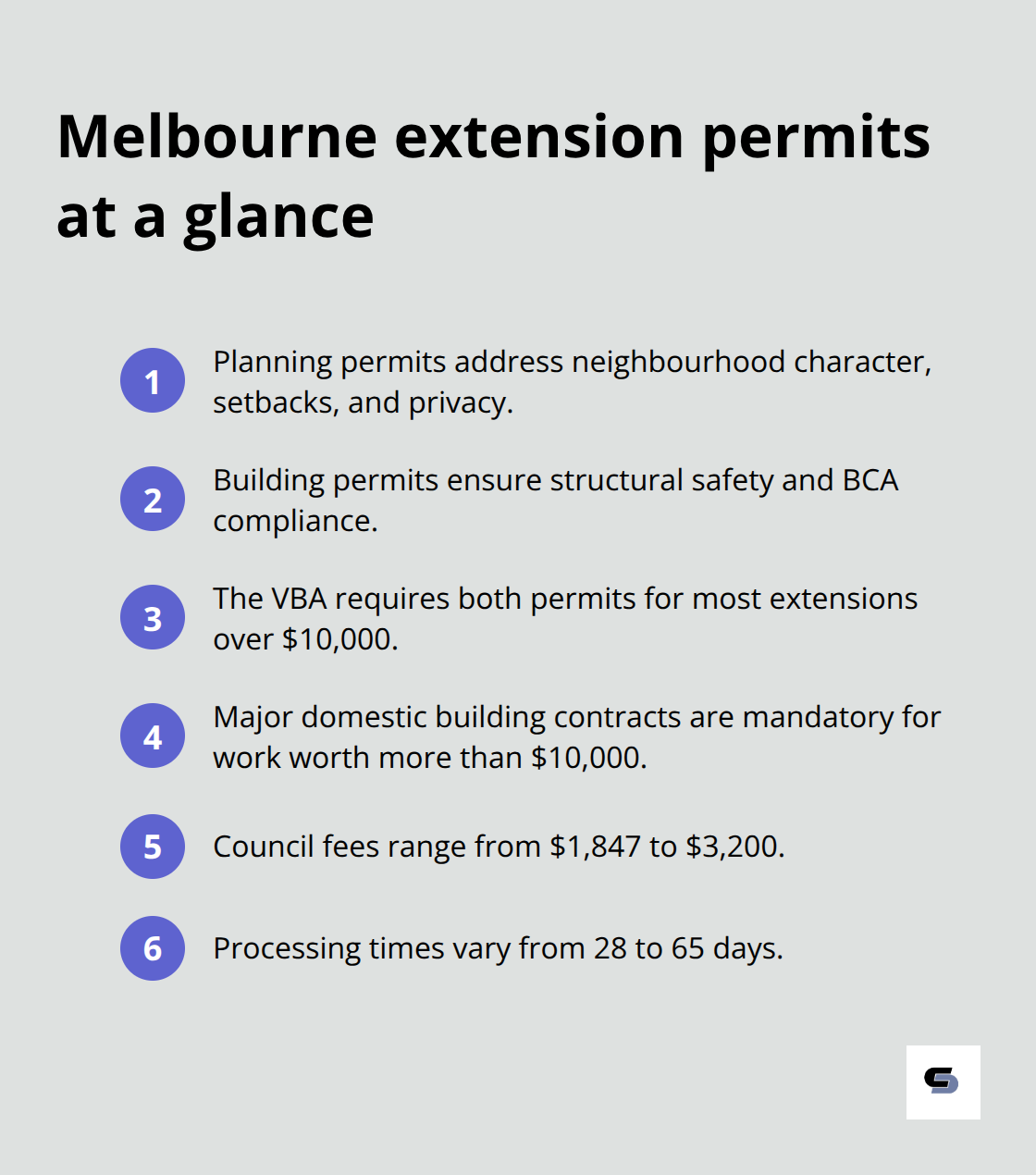
Council fees range from $1,847 for basic extensions in Moreland to $3,200 for complex applications in Bayside. Processing times vary from 28 days in efficient councils to 65 days in heritage-heavy areas. Each council interprets planning policies differently, which creates significant variation in approval requirements across Melbourne.
Building Code Compliance Determines Construction Standards
The Building Code of Australia mandates specific requirements that directly impact extension costs and design. Ceiling heights must reach 2.4 metres minimum, with natural light requirements that demand windows equal to 10% of floor area. Energy efficiency standards require R2.5 wall insulation and R6.0 ceiling insulation, which adds $2,800-$4,200 to typical extension budgets.
Structural engineers must certify all second storey additions, with foundation assessments that cost $1,500-$2,800 depending on soil classification and existing structural capacity. These compliance requirements form the foundation for accurate cost estimates.
Professional Fees Add Substantial Project Costs
Building surveyors charge $2,200-$3,800 for permit applications and inspections throughout construction. Architects or building designers typically charge 8-12% of total construction value for detailed plans and permit documentation. Town planners may be necessary for complex heritage or neighbourhood character assessments (adding $3,500-$6,500 to professional fees).
These permit requirements and professional costs directly influence your extension budget and timeline, making accurate cost estimation the next step in your planning process.
What Drives Extension Costs in Melbourne
Extension costs in Melbourne fluctuate dramatically based on three primary factors that directly impact your budget. Size remains the strongest cost predictor, with ground floor extensions experiencing significant price increases, while double storey builds reach $3,200-$4,500 per square metre according to Victorian Building Authority data. Second storey additions command premium rates of $4,200-$5,800 per square metre due to structural complexity and foundation upgrades that typically add $15,000-$35,000 to project budgets.
Extension Size Creates the Biggest Budget Impact
Melbourne extension costs follow a clear size-based structure that rewards larger projects with better per-square-metre rates. Extensions under 30 square metres face higher unit costs due to fixed setup expenses, mobilisatiion fees, and minimum contractor charges. Projects between 40-60 square metres achieve optimal cost efficiency, while extensions over 80 square metres often require additional structural work that increases complexity. The September 2025 data shows residential values at $8.93 billion, which reflects this trend toward larger, more comprehensive extensions rather than small additions.
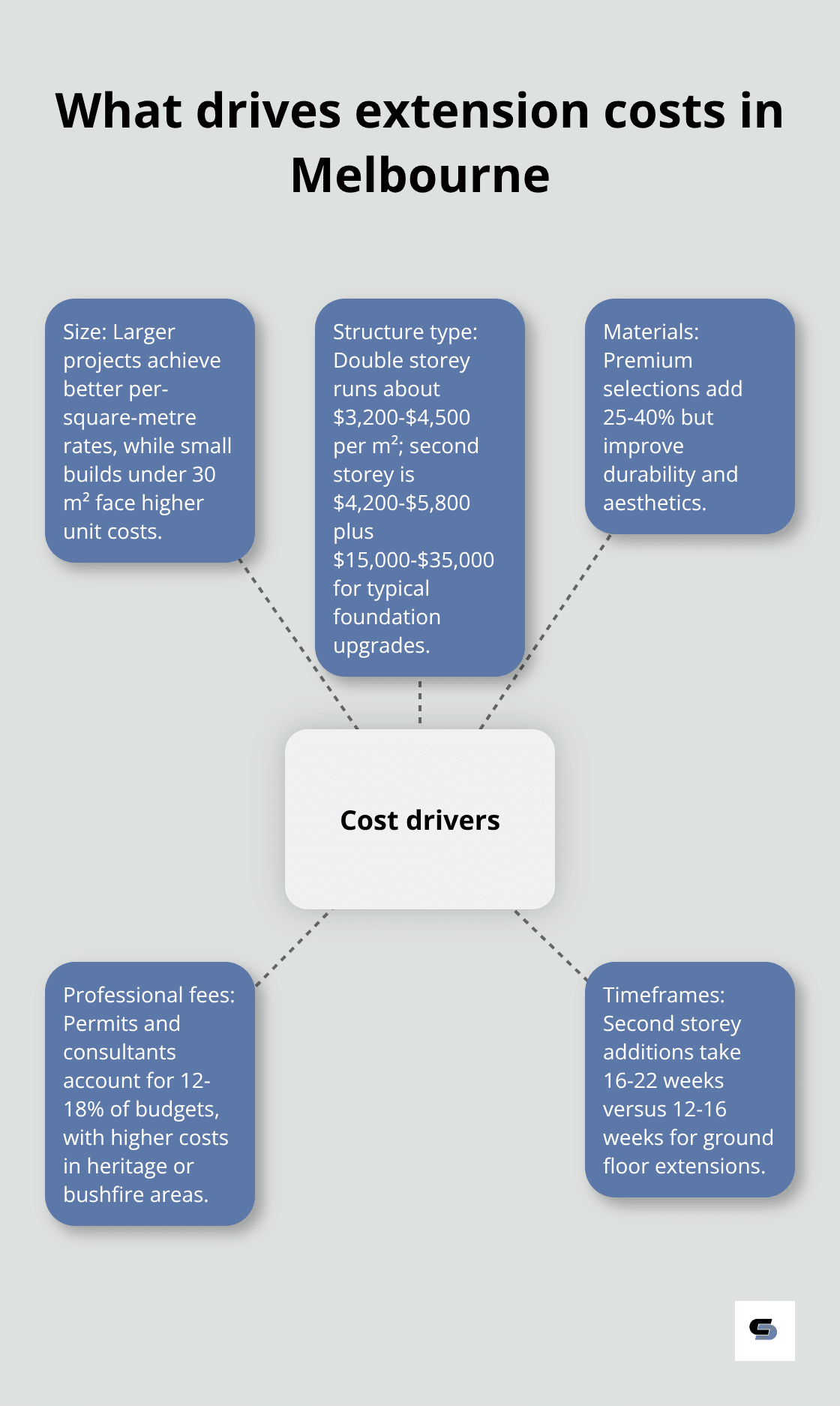
Material Selection Determines Quality and Timeline
Premium materials add 25-40% to base construction costs but deliver superior durability and aesthetic appeal. Engineered stone benchtops cost $180-$320 per linear metre compared to laminate at $85-$140, while hardwood floors reach $120-$180 per square metre versus hybrid alternatives at $65-$95. Structural steel for second storey additions costs $3,200-$4,800 per tonne (significantly more than standard timber frames but necessary for spans over 4.5 metres).
Professional Fees Vary Across Melbourne Councils
Permit and professional costs represent 12-18% of total project budgets, with significant variation across Melbourne councils. Heritage overlay areas in inner Melbourne require additional consultant reports that cost $2,800-$4,500, while bushfire-prone outer suburbs demand specialised assessments that add $1,500-$2,200. Building surveyors charge $2,200-$3,800 for standard extensions, but complex second storey additions that require structural certification can reach $4,500-$6,200. Architects typically charge 8-12% of construction value, which makes professional selection critical for budget management.
Final Thoughts
Melbourne homeowners face three viable extension paths, each suited to specific property constraints and lifestyle requirements. Double storey extensions maximise narrow blocks under 8 metres wide, ground floor additions work best on deeper blocks with 15+ metre setbacks, while second storey conversions suit established homes with adequate structural capacity. Your block dimensions, budget, and family needs determine the optimal approach for house extensions Melbourne projects.
Double storey builds cost $3,200-$4,500 per square metre but deliver maximum space efficiency on premium inner-city sites. Ground floor extensions at $2,800-$3,800 per square metre provide seamless indoor-outdoor flow for families who prioritise garden access. Second storey additions require foundation upgrades that cost $15,000-$35,000 but often generate the highest property value returns (particularly on established properties with strong structural foundations).
Professional selection proves critical for successful extension projects. We at Cameron Construction handle concept to completion work across Melbourne, which includes planning, permits, and BCA compliance across all councils. Start your extension journey by assessing your block constraints, defining your budget parameters, and engaging experienced professionals who understand Melbourne’s unique planning requirements.

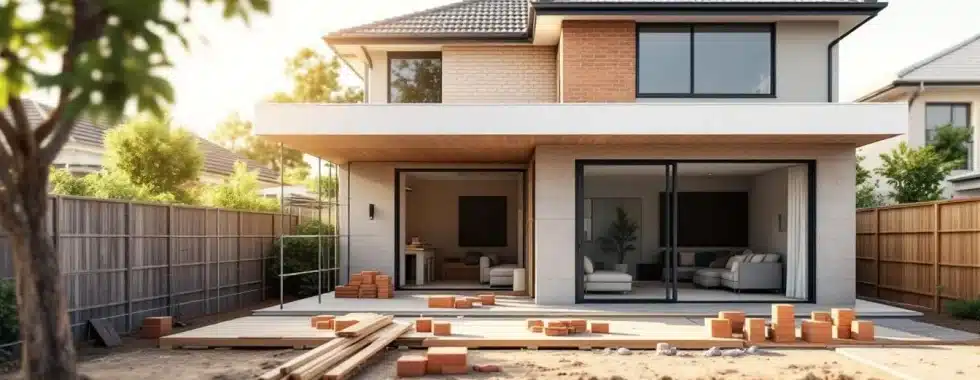
![Second Storey Additions For Growing Families [Guide]](https://www.cameronconstruction.com.au/wp-content/uploads/emplibot/second-storey-additions-hero-1772259809-150x150.webp)

